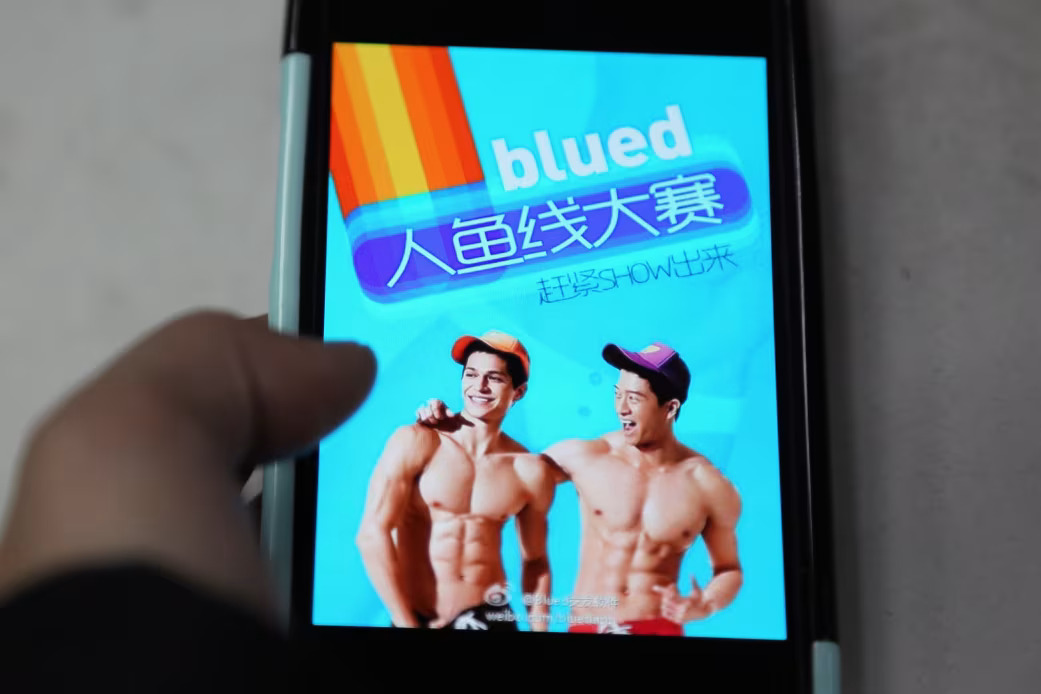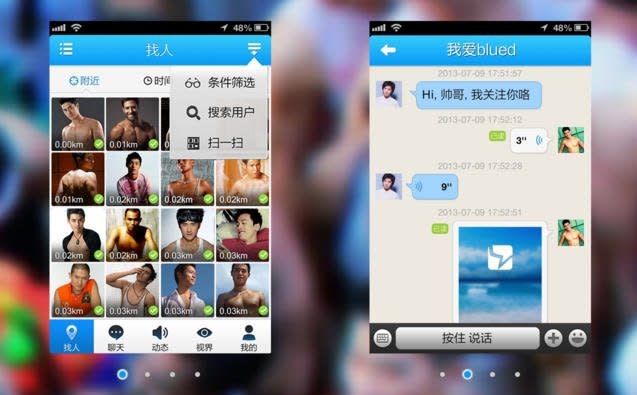
In a country where public Pride events are banned, queer film scenes censored, and even university groups dissolved, this latest erasure underscores the Chinese government’s growing obsession with policing love, identity, and connection itself.
Two of China’s most widely used gay dating apps, Blued and Finka, have vanished from the country’s app stores, a chilling reminder of how quickly queer visibility can be erased in the world’s most surveilled nation.
As of Tuesday, iPhone users in China could no longer download the apps from Apple’s China storefront, and several Android platforms followed suit. Apple confirmed the removal was “based on an order from the Cyberspace Administration of China.” Those who already had the apps installed can still use them for now but new users are locked out.
Blued, founded in 2012, had grown into a global social hub with tens of millions of users. Finka, its younger and trendier counterpart, catered to Gen Z queer folks and was acquired by Blued’s parent company in 2020. Together, they formed the backbone of China’s digital queer community, a community now under siege.

One user from Beijing shared that the disappearance felt like “losing the last window to see people like me.” He added, “There hasn’t been much space offline for the gay community to begin with. Now that the online space is also being restricted, the community’s room to breathe feels smaller and smaller.”
That sense of suffocation echoes across Chinese social media, where users have quietly mourned the loss. One wrote, “Blued made countless people realize they weren’t alone.” In a society where visibility is survival, the disappearance of these apps feels less like a glitch and more like an act of digital violence.
Let’s not pretend this is a mystery. China’s censorship regime, often called the “Great Firewall,”is one of the most comprehensive in the world. The state has long cracked down on anything that challenges its conservative social order or the image of the Communist Party.
In the past decade, Beijing has banned television shows featuring same-sex relationships, shut down university LGBTQ+ organizations, and scrubbed films with queer subplots. Even fashion and pop culture haven’t escaped scrutiny; effeminate male celebrities have been publicly denounced for promoting “unhealthy aesthetics.”
This is all part of a larger ideological project under President Xi Jinping, one that seeks to reinforce “traditional family values” and eliminate what the state calls “Western influence.” In that worldview, queer existence isn’t just undesirable, it’s foreign, dangerous, destabilizing.
Homosexuality was decriminalized in China in 1997, but same-sex marriage remains illegal, and queer rights activism is often stifled before it can take root. While officials rarely speak explicitly about LGBTQ+ issues, they wield vague justifications, “compliance issues,” “vulgar content,” “national harmony,” as tools to censor.
These terms give cover to what’s really happening—the state’s discomfort with any form of collective identity it doesn’t control. Queer people organizing online, finding love, or simply existing publicly represent a kind of autonomy that authoritarianism can’t tolerate.
And multinational corporations like Apple? They comply without hesitation. “We follow the laws in the countries where we operate,” Apple said in a statement. That’s another way of saying, profit over principle. When billion-dollar access to the Chinese market is on the line, global tech companies will look away as entire communities vanish behind firewalls.
This is nothing more than a state-sanctioned erasure wrapped in bureaucratic politeness. By removing these apps, China isn’t just limiting downloads, it’s sending a message. It’s saying to millions of queer people, “We will tolerate your silence, not your connection.”
And to the world, it says something even more chilling, “We can erase visibility at will.”
There is nothing apolitical about this. Every vanished app, every canceled Pride, every scrubbed film and deleted post is part of an orchestrated campaign to return queer life to the shadows. The crackdown isn’t random, it’s strategic. It isolates people who rely on these digital spaces to meet, to love, to survive.
The cruelty lies not just in censorship, but in how familiar it has become. Each new restriction lands with less shock, more resignation. The danger of living under constant repression is that you start to mistake suffocation for air.
Offline, queer nightlife and organizing spaces in China have already been pushed to the margins. Now, even online, the remaining spaces are being wiped clean. This compounds the emotional and psychological toll for people who rely on community visibility for safety and affirmation.
In cities where there are no Pride parades, no affirming churches, no public platforms for expression, apps like Blued and Finka filled a vital void. They were more than dating platforms, they were sanctuaries, lifelines, love letters in code. To lose them is to lose access to one of the few mirrors that reflect queer life in China honestly.
These apps contribute to social stability and harmony. Why remove them?” The question is rhetorical, of course. The answer lies in power, who has it, who resists it, and who is punished for existing outside its rules.
It’s unclear whether Blued or Finka will be reinstated. Perhaps they’ll resurface in some sanitized form, stripped of the queerness that made them vital in the first place. Perhaps they’ll disappear permanently, another casualty of censorship.
But even in the shadows, connection persists. The queer community has always adapted, through coded language, underground meetups, VPNs, and courage that outlasts policy. Still, resilience should not be mistaken for consent. No one should have to fight this hard just to find love, community, or a sense of belonging.
Because make no mistake, this isn’t about “vulgarity” or “morality.” It’s about fear; fear of freedom, fear of difference, fear of a love that answers to no state.
And if history tells us anything, it’s that love, real, ungoverned love, always finds a way back online.